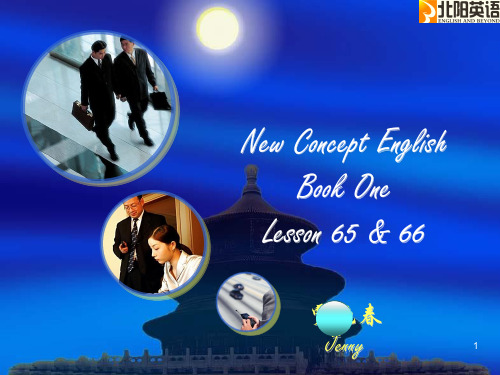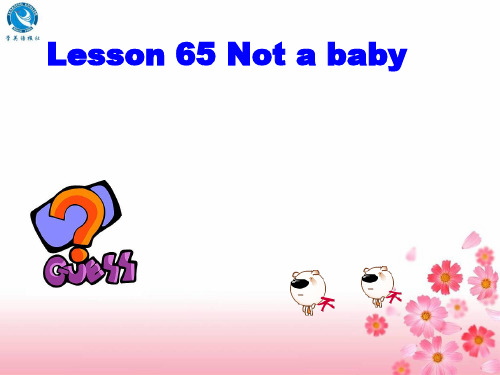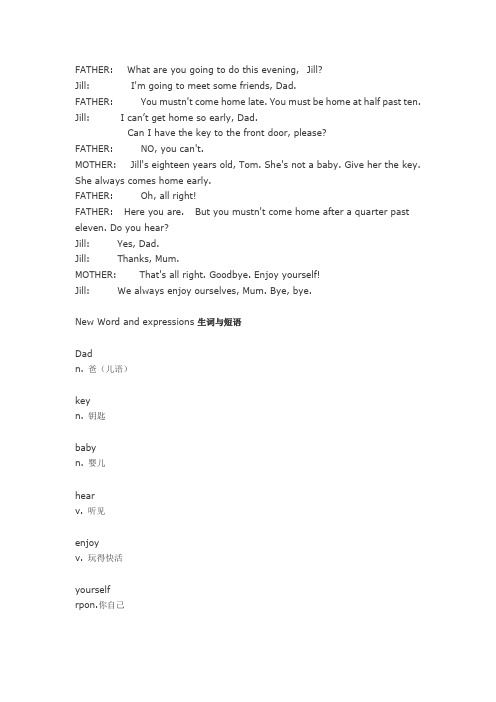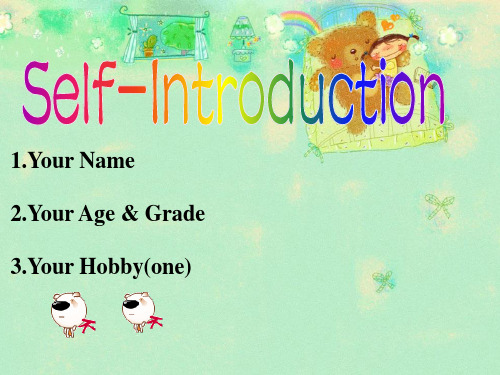新概念第一册 第65课
新概念一册65课

on+星期/日期/节日/具体的某一天: on Monday on Christmas Day on April 1st on the morning of May 25th
in+月份/季节/城市/国家: in July in spring in Wuhan
in China
7
4. 反身代词: 当宾语和主语是同一个人时,一般需要用反身代词 He cut himself when he was shaving this morning. 今天早晨刮胡子时,他把脸刮破了。
6
The old lady is talking to herself. 那位老妇人正在自言自语。 ★介词 at+具体的时刻: He goes to school at 7. 30.
2.Does Jill take the key to the front door?
★Notes
1.Jill's eighteen years old, Tom. 〖分析〗表示“几岁”,基数词+ year(s) old;在口语中, year(s)old常可以省去,而只用数字表示年龄。
2.That's all right. 不用谢。 不用谢: You're welcome. Not at all. It is my pleasure. 3. Bye-bye. 再见。 再见: Goodbye. See you. See you later.
Lesson 65
Not a baby
★New Words: Dad n. 爸爸 (儿语) Mum n. 妈妈 key n. 钥匙 baby n. 婴儿 hear v. 听见 enjoy v. 玩得快活 yourself pron. 你自己 myself pron. 我自己 himself pron. 他自己 herself pron. 她自己 ourselves pron. 我们自己 yourselves pron. 你们自己 themselves pron.他们自己
新概念英语第一册单词 第65课:不是一个小孩子

新概念英语第一册单词第65课:不是一个小孩子 dad[dd] 爸爸(儿语)key [ki] 钥匙baby ['beb] 婴儿【派生词】babyhood婴儿时期 babysitter保姆【单词扩充】nestling婴孩 neonate初生婴儿 nursling婴儿【单词例句】A:The baby is crying.A:那个婴儿哭了。
B:Maybe he is hungry.B:也许他是饿了。
hear [h] 听见【派生词】hearing听力【单词扩充】sound听起来【单词搭配】hear of听说 hear from收到某人的来信【单词例句】A:I can't hear anything.A:我什么也听不到。
B: Me too. It is so noisy here.B:我也足,这儿太吵了。
enjoy [n'd; en-] 玩得开心【单词构造】en(表示“使、让”的前缀)+ joy(欢乐)=enjoy(玩得开心)【派生词】enjoyment享受【单词扩充】relish享受【单词搭配】enjoy oneself玩得开心 enjoy the food享用食物【单词例句】A: How is the party last night?A:昨晚的聚会怎么样?B:We didn’t enjoy ourselves at all.B:我们玩得一点儿都不痛快。
yourself [j'self; j-; j-] pron.你自己【单词例句】A: It's a photograph that I took on my vacation last year.A:那是我去年度假时拍的照片。
B:You took it yourself?B:你自己拍的吗?ourselves [a'selvz] pron.我们自己。
新概念第一册第65课

6
Dad Key Baby Hear Enjoy yourself
New words
7
New words
Ourselves Mum Myself Themselves Himself herself
28
When must Sam and Penny see the boss? They must see the boss at half past one.
29
When must George take his medicine? He must take his medicine at a么? 我打算去看几个朋友. 你不准回家太晚. 你必须在10点半到家.
9
翻译练习
这么早我到不了家. 我能带上前门的钥匙吗? 不行,你不能带. 你不能超过11点1刻回家. 好好玩吧!
10
时间的表达
1:00 one o’clock 2:00 two o’clock
2:40 twenty to three 4:50 ten to five
15
--What’s the time? --What time is it? --It’s …
12641::0:1:3505005
16
日期的表达
January 13th January 31st
In the morning In the evening On July 18th In July
three.
30
When must Sophie drive to London? She must drive to London at half past two.
新概念英语65课讲义全

Lesson65 Not a baby 不是一个孩子一、单词与短语Dad: n.爸〔儿语〕;mum: n.妈妈;baby: n.婴儿;Key: n.钥匙;the key to the door:门的钥匙;n.关键、答案;key to the test:试题答案;adj.主要的,关键的;key player:核心队员;hear:v.听见;关于hear两个常见的短语:hear of:听见;Did you hear of what he said? 听见他说什么了吗啊?Hear from:收到、、、的来信;I hear from him once a week.我每周收到他的一封来信;Enjoy: v.玩的快活,享受;常见短语:enjoy oneself:玩得快乐,与have a good time同义,可以互换。
Yourself:pron.你自己;ourselves:pron.我们自己;二、短语句型与语法1、what are you going to do this evening, Jill?吉尔,今天晚上你要去干什么?在英语中,这是一个常见的句型,用一般将来时be going to问某人打算干什么,答复时要用I am going to、、、我要去、、、例:what are you going to do this evening, Jill?吉尔,今天晚上你要去干什么?I am going to meet my friends.我要去看朋友。
What is Tom going to do tomorrow afternoon?明天下午汤姆去干什么?He is going to go shopping with his mum.他要陪她妈妈去逛街。
2、Jill is eighteen years old,mum.妈妈,吉尔都十八岁了。
在本句中需要引起注意的是年龄的表达法。
在英语中表达"……岁",可以只用数词,也可以在数词后面加上years old,初中阶段重点掌握以下两种表达方式即可,例如:"我十三岁。
新概念英语一册第65课课件(共41张PPT)

revision
时间表达法口诀
时间顺读时后分, 时间逆读分后时。 三十以内past连, 三十以后to中间。 分用六 o’clock 2:00 two o’clock
2. 顺时表达
3:10 three ten 4:16 four sixteen
(likhea,venajoygo,omdintdim, efi)nish l•ikeenjdooyindgoisntgh.sth.
mind doing sth. finish doing sth.
单词 闯天下
enjoy mum Dad key baby hear
It’s time to watch.
How old are you? Do you have any friends? Do you often meet your friends? Can you get home at 8’clock? Do you always come home early? When must you come home?
must stay Can… sing can type Must... come can’t go mustn’t play
1.抄写单词三英一汉
2.读课文三遍 3.做练习题4
逆时表达
3.一刻钟/半点
5:15 a quarter past five
6:30 half past six
4.半小时之前用past
7:10 ten past seven 8:16 sixteen past eight
5.半小时以后用to
2:40 twenty to three 4:50 ten to five
新概念英语第一册第65课课件NCE1Lesson65

• must三大句子 • I must go home.(肯定句) • I must not go home.(否定句) • Must I go home?(疑问句) Yes, you must./No, you mustn’t.(不可以) No, you needn’t.(不必)
can type I __________this letter. I __________at must stay home. can’t go She ____________to school yet. mustn’t play We ______________with matches. Can you ______ sing a song? ______ Must he ______ come home early? ______
Listen to the tape then answer these questions. 4. Does her father want to give her the key? No, he doesn’t. 5.When must Jill get home? She must get home before a quarter past eleven. 6. Do she and her friends always enjoy themselves?
Can I have the key to the front door, Jill’s eighteen years old,Tom. She’s not a baby.Give her the Please? key.She always comes home ear No,you can’t. Oh,all right.
n. 爸(儿语) n. & adj.钥匙;关键的 n. 婴儿 v. 听见 v. 玩得快活 pron.你自己 pron.我们自己 n. 妈妈
新概念英语第一册第65-66课Not a baby

新概念英语第一册第65-66课:Not a babyLesson 65 Not a baby不是一个孩子Listen to the tape then answer this question.Does Jill take the key to the front door?听录音,然后回答问题。
吉尔有没有拿到大门的钥匙?FATHER: What are you going to do this evening, Jill?父亲:今晚你打算干什么,吉尔?Jill: I'm going to meet some friends, Dad.吉尔:我打算去看几个朋友,爸爸。
FATHER: You mustn't come home late. You must be home at half past ten.父亲:你不准回家太晚,你必须在10点半到家。
Jill: I can’t get home so early, Dad.吉尔:这么早我到不了家,爸爸!Jill: Can I have the key to the front door, please?吉尔:我能带上前门的钥匙吗?FATHER: NO, you can't.父亲:不行,你不能带。
MOTHER: Jill's eighteen years old, Tom. She's not a baby. Give her the key. She always comes home early.母亲:吉尔都18岁了,汤姆。
她不是小孩子了。
把钥匙给她吧。
她总早早回家的。
FATHER: Oh, all right!父亲:那么,好吧!FATHER: Here you are. But you mustn't come home after a quarter past eleven. Do you hear?父亲:拿去。
新概念英语第一册第65课

新概念英语第一册第65课Lesson 65 A thief at the lodge旅店里的小偷First listen and then answer the question.听录音,然后回答以下问题。
Why did the writer dislike the look of the stranger?I had been living in a small village in Switzerland for about three months when I met him. He said his name was Max West and that he came from Berlin. I did not like the look of him from the very beginning. He was quite tall, but he was very thin, and he had dark, deep-set eyes which always seemed to be brooding over something.He arrived at the little inn early one evening when it was already growing dark. He had no luggage except a small black suitcase, and he asked for a room for the night. I was sitting in the common room of the inn when he arrived. There was no one else there except the innkeeper who was busy with some papers. I noticed that the stranger had a nervous manner and that he kept looking around the room, and even outside, as if he was afraid someone might be following him.The innkeeper showed him to his room which was next to mine. During the night I was awakened several times by a sound in the next room. It sounded as if someone was moving furniture about.Towards morning the noise stopped and I fell asleep.During breakfast the following morning, I saw the stranger. He was wearing a dark suit and was sitting alone at a table in the corner of the room. He had a newspaper in front of him, but he was not reading it.After breakfast I left the inn to go and work on the land. I did not return until late in the evening. When I entered the common room, I saw that the stranger had gone. Shortly afterwards, the innkeeper came rushing up to me. He was in a state of great excitement because someone had broken into the small locked room behind the inn. The thief had stolen all the food and drink that the innkeeper had stored there. The police were called, but the thief was never caught.I am quite sure that the stranger was the thief, but there was, of course, no way of proving it.。
新概念第一册_第65课

Father:What are you going to do this evening ,Jill? Jill:I’m going to meet some friends ,Dad.
见朋友
Father:You mustn’t come home late . You must be home at half past ten. Jill:I can’t get home so early ,Dad!
★enjoy v. 玩得快活;乐于,喜爱;享受 • enjoy+ 反身代词:玩得高兴 She enjoyed herself in the vacation. • enjoy+ n.(物体) 喜欢…… I enjoyed that meal. • enjoy doing sth. 喜欢做某事 We enjoyed driving along the new highway. We all enjoy our legal rights.
Father:Here you are.But you mustn’t come home after a quarter past eleven. Do you hear?
after:…之后 如:晚饭后after dinner
Jill:Yes ,Dad.
下课后?放学后?
Jill:Thanks ,Mum. Mother:That’s all right.
must & mustn’t
throw the waste out of the window
study hard every day
obey traffic rules be late for school play on the road be active in the classroom
新概念英语第一册65课

You mustn’t come home last.
You must be home at half past ten.
I can’t get home so early
32
• come home 回家 [我在家,跟你说:回
家时用.]
• be home 在家[表示在家的状态]
• go home 回家 [我在外,跟你说我要回 家时用.] • get home 到家
When is Mary going to watch TV tonight ?
going to buy They arebuy not
a ball this afo buy a ball this afternoon ? What are they going to buy a ball this afternoon ?
★ yourself pron. 你自己(反身代词)
1.当宾语和主语是同一个人时,一般需要用 反身代词 The old lady is talking to herself.
老妇人自言自语。 I teach ________ English. myself 我自学英语。
2.反身代词有:
myself, herself,
用listen或hear的适当形式填空 listen but_____nothing. hear • 1.I ______
我注意听了,但什么也没听见。 Listen A girl is singing. 2._________! heard from Mr.Sawyer yesterday. 3.I ______ 4.She is __________ listening to the radio now. 5.Did you _____ hear a noise under the bed?
新概念英语65课课件

Lesson65 Not a baby 不是一个孩子一、单词与短语Dad: n.爸(儿语);mum: n.妈妈;baby: n.婴儿;Key: n.钥匙;the key to the door:门的钥匙;n.关键、答案;key to the test:试题答案;adj.主要的,关键的;key player:核心队员;hear:v.听见;关于hear两个常见的短语:hear of:听见;Did you hear of what he said? 听见他说什么了吗啊?Hear from:收到、、、的来信;I hear from him once a week.我每周收到他的一封来信;Enjoy: v.玩的快活,享受;常见短语:enjoy oneself:玩得高兴,与have a good time同义,可以互换。
Yourself:pron.你自己;ourselves:pron.我们自己;二、短语句型及语法1、what are you going to do this evening, Jill?吉尔,今天晚上你要去干什么?在英语中,这是一个常见的句型,用一般将来时be going to问某人打算干什么,回答时要用I am going to、、、我要去、、、例:what are you going to do this evening, Jill?吉尔,今天晚上你要去干什么?I am going to meet my friends.我要去看朋友。
What is Tom going to do tomorrow afternoon?明天下午汤姆去干什么?He is going to go shopping with his mum.他要陪她妈妈去逛街。
2、Jill is eighteen years old,mum.妈妈,吉尔都十八岁了。
在本句中需要引起注意的是年龄的表达法。
在英语中表达"……岁",可以只用数词,也可以在数词后面加上years old,初中阶段重点掌握以下两种表达方式即可,例如:"我十三岁。
新概念第一册第65课课件

Homework
1. 背诵65课课文及单词、短语,背66课单词。 2. 抄写65、66课单词,每个五遍 3. 书上132页练习B,写在作业本上。 4. 完成65课及66课练习册的所有练习。
Lesson 65 Not a baby
key
1.钥匙 the key to the door 2.答案 the keys to the questions the answers to the questions 3.主要的 key words 关键词 key man 重要人物
Grammar
第一人称 第二人称 单 数 复 数
第三人称
myself
yourself
himself herself
itself
Байду номын сангаас
ourselves yourselves
themselves
【注】第一、第二人称:形容词性物主代词 + self / selves;
第三人称:宾格 + self / selves
Text JILL: Can I have ... the front door please? FATHER: No, ....
Text MOTHER: Jill's ...old, Tom. She's .... Give.... She always ... early. FATHER: Oh, ...!
hear
v. 听见
Can you hear me? I hear a strange sound. 我听到了一种奇怪的声音。 hear from 收到某人来信
I hear from him once a week.
新概念英语第一册lesson 65 Not a baby

FATHER: What are you going to do this evening, Jill?Jill: I'm going to meet some friends, Dad.FATHER: You mustn't come home late. You must be home at half past ten. Jill: I can’t get home so early, Dad.Can I have the key to the front door, please?FATHER: NO, you can't.MOTHER: Jill's eighteen years old, Tom. She's not a baby. Give her the key. She always comes home early.FATHER: Oh, all right!FATHER: Here you are. But you mustn't come home after a quarter past eleven. Do you hear?Jill: Yes, Dad.Jill: Thanks, Mum.MOTHER: That's all right. Goodbye. Enjoy yourself!Jill: We always enjoy ourselves, Mum. Bye, bye.New Word and expressions 生词与短语Dadn. 爸(儿语)keyn. 钥匙babyn. 婴儿hearv. 听见enjoyv. 玩得快活yourselfrpon.你自己pron.我们自己mumn. 妈妈本文参考译文父亲:今晚你打算干什么,吉尔?吉尔:我打算去看几个朋友,爸爸。
父亲:你不准回家太晚,你必须在10点半到家。
新概念一册第65课

tongue
•
n.
舌头
I can stick out my tongue. 我能伸出我的舌头。
bad
• • • • • •
adj.
坏的,严重的
Excuse her bad manners. 原谅她的坏态度。 He changes his bad habits. 他改变了他的坏习惯。 My heart chilled when I heard the bad news. 听到这个坏消息时,我的心都凉了。
look
v.
看起来
1.How well you look! 你看来多么健康啊! 2. He did not look like an evil person. 他看起来不像一个恶人。 3. Look at this pictures. 看这幅图片!
must
n.
必须
我们必须努力学习英语! We must learn English hard!
cold
He has a bad cold.
n.
感冒
I’m sorry to hear that.
headache
n.
头痛
earache
n.
耳痛
toothache
n.
牙痛
stomach-achen.胃痛Reading
Time
telephone
n.
电话
Apple 5S is the latest smart-phone. 苹果5s 是最新款智能手机。
remember
v.
记得
1. So you remember me. 因此你记得我。 2. I remember meeting you one evening. 我记得有天晚上见过你。 3. Don’t remember to do the homework. 别忘了写作业。
新概念第一册-lesson-65-Not-a-baby-不再是个孩子了说课讲解

L65 Not a baby 不是一个孩子
JILL: Can I have the key to the front door please? FATHER: No, you can‘t.
➢ to引导的介词短语 ➢意思是“前门的”钥匙 the way to the school 去学校的道路 the exit to the building 大楼的出口 the entrance to the hall 会堂的入口 the answer to the question 问题的答案 the bridge to knowledge 知识的桥梁
我给她买了一个蛋糕为生日礼物。
• The old man always tells the children stories about the heroes in the Long March. 老人经常给孩子们讲述长征途中那些英雄的故事
新概念第一册-lesson-65-Nota-baby-不再是个孩子了
twins 双胞胎
baby
Mum
Dad
child children
teenager
青少年
adult
Middle-aged
L65 Not a babyfa不t是he一r个孩子
mother
Jill
key
1. baby ['beɪbɪ] n. 婴儿
be going to与will 表示“将来、将要”
如下几点区别: ① be going to 表示近期、眼下就要发生的事情,
will 表示的将来时间则较远一些。
【例】:He is going to write a letter tonight. 她今夜将写封信 He will write a book one day. 他有天会写本书
新概念第一册Lesson65

Father: You mustn't come home late. You must be home at half past ten. Jill: I can't get home so early, Dad!
Jill: Can I have the key to the front door please? Father: No, you can't.
Not a baby
I’m not a baby!!!!
1.
Listen and
answer the questions
Questions:
1. How many people are there in the story? 2.What is Jill going to do this evening? 3.How old is Jill? 4.What time must Jill come home at last?
40
• Enjoy yourself! • I always enjoy myself. • We are enjoying ourselves.
• They are enjoying themselves. • He is enjoying himself. • She is enjoying herself.
2.Grammar
情态动词can和must
没有人称没有数,动词原形跟在后, 否定疑问自身变。 must一般疑问句,否定回答是难点, needn’t来回答,意为不必了, mustn’t意为不可以,禁止。
can type I __________this letter. I __________at must stay home. can’t go She ____________to school yet. mustn’t play We ______________with matches. Can you ______ sing a song? ______ Must he ______ come home early? ______
新概念第一册65课

新概念第一册
Lesson 65 Not a baby
词 汇
•
• • • • • •
Dad n. 爸(儿语)
key n. 钥匙 adj.关键的 baby n. 婴儿 hear v. 听见 enjoy v. 玩得快活 yourself pron.你自己 ourselves pron.我们自己
• • • •ຫໍສະໝຸດ 课 文••
• • • • • • • • • • •
What are you going to do this evening, Jill? I'm going to meet some friends. Dad. You mustn't come home late. You must be home at half past ten. I can't get home so early, Dad! Can I have the key to the front door please? No, you can't. Jill's eighteen years old, Tom. Give her the key. She always comes home early. Oh, all right! Here you are.
• • • • •
keyboard 键盘 key words 关键的话语 key point 关键点 the key to the door the key to the front door
• • • • • • •
enjoy sth. enjoy oneself enjoy doing sth. myself pron. 我自己 themselves pron. 他们自己 himself pron. 他自己 herself pron. 她自己
新概念英语第一册65课单词

新概念英语第一册65课单词摘要:一、新概念英语第一册65 课简介1.新概念英语第一册背景介绍2.65 课在整本书中的地位二、65 课单词列表1.单词一:student2.单词二:teacher3.单词三:classroom4.单词四:school5.单词五:pupil6.单词六:board7.单词七:blackboard8.单词八:pen9.单词九:pencil10.单词十:book11.单词十一:eraser12.单词十二:ruler13.单词十三:nose14.单词十四:ear15.单词十五:eye16.单词十六:face17.单词十七:head18.单词十八:arm19.单词十九:hand20.单词二十:leg21.单词二十一:foot22.单词二十二:toe23.单词二十三:body24.单词二十四:shoulder25.单词二十五:knee26.单词二十六:ankle27.单词二十七:thigh28.单词二十八:calf29.单词二十九:waist30.单词三十:hip31.单词三十一:breast32.单词三十二:chest33.单词三十三:back34.单词三十四:neck35.单词三十五:chin36.单词三十六:headache37.单词三十七:toothache38.单词三十八:stomachache39.单词三十九:earache40.单词四十:head41.单词四十一:shoulder42.单词四十二:knee43.单词四十三:elbow44.单词四十四:wrist45.单词四十五:ankle46.单词四十六:thigh47.单词四十七:calf48.单词四十八:waist49.单词四十九:hip50.单词五十:breast51.单词五十一:chest52.单词五十二:back53.单词五十三:neck54.单词五十四:chin55.单词五十五:knee56.单词五十六:elbow57.单词五十七:wrist58.单词五十八:ankle59.单词五十九:thigh60.单词六十:calf61.单词六十一:waist62.单词六十二:hip63.单词六十三:breast64.单词六十四:chest65.单词六十五:back三、65 课单词学习方法1.重复记忆2.创造语境3.使用单词卡片4.结合图片学习正文:新概念英语第一册65 课主要介绍了日常生活中常见的一些身体部位和疾病名称的英文表达。
- 1、下载文档前请自行甄别文档内容的完整性,平台不提供额外的编辑、内容补充、找答案等附加服务。
- 2、"仅部分预览"的文档,不可在线预览部分如存在完整性等问题,可反馈申请退款(可完整预览的文档不适用该条件!)。
- 3、如文档侵犯您的权益,请联系客服反馈,我们会尽快为您处理(人工客服工作时间:9:00-18:30)。
She’s going to meet some friends.
2.When must she come home ? She must be home at half past ten. 3.What does she want to do ? She wants to have the key to the front door 4.Does Jill take the key to the front door ? Yes,she does.
must & mustn’t
throw the waste out of the window
study hard every day
obey traffic rules be late for school play on the road be active in the classroom
cross the road when the light is red
Father:Here you are.But you mustn’t come home after a quarter past eleven. Do you hear?
after:…之后 如:晚饭后after dinner
Jill:Yes ,Dad.
下课后?放学后?
Jill:Thanks ,Mum. Mother:That’s all right.
I You
myself yourself
He
She We They
always enjoy(s)
himself herself ourselves themselves
it
itself
用后缀-self或者-selves构成。
反身代词的主要用法有:
①在句子中作宾语,表示动作回射到动作的执行本身。 如:The old woman is too old to look after herself.
come home 和be home 的区别,前者表 示回家的动作,后者表 示回家的状态。
get home: arrive home
Jill:Can I have the key to the front door ,please? Father:No,you can’t .
这边的key是钥匙,它 还可做答案如:key to exercises
Mother:Jill’s eighteen years old ,Tom.She’s not a baby .Give her the key.She always 问对方的年龄可 comes home early. 以用How old…..?
Father:Oh,all right !
好吧,就这样的意思
这边的all right 和前面 不同,可以用You’re welcome替换。 Have a good time .
Yourself,ourselves是 反身代词
Good-bye. Enjoy yourself!
Jill:We always enjoy ourselves ,Mum . Bye-bye.
7:00 8:15 9:30
seven o’clock a quarter past eight
half past nine
11:45
a quarter to eleven
问时间点可以用:What time 或when? 如:现在几点?------What time is it /What’s the time?or When is it ?
②在句子中作名词或代词的同位语,用来加强语气, 常可译为“亲自”、“本人”等。 如: The garden itself is not so beautiful . ③反身代词在实际运用中可构成许多常用词组。 如:enjoy oneself(开心,高兴,玩的痛快),teach oneself(自学),dress oneself(自己穿衣服),come to oneself(苏醒),help oneself to(随意用……),lose oneself in(专心于……)等。
பைடு நூலகம்
问时间段用when?
如:你今天什么时候起床?When do you get up today?
例句:You mustn’t come home late. You must be home at half past ten. 句中时间点提问时,要用when 疑问词 When must be home ?
挑战一下:
1.She must go to the library at a quarter past one.
2.We must see the dentist at a quarter to four. 3.I must type this letter at two o’clock. 4.They must see the boss at half past one. 5.He must telephone me at a quarter to three.
Lesson 65
Not a baby
dad
key
mum
babies
son baby
Answer the questions :
1.Is Jill going to stay at home this evening ? 2.Can she get home at half past ten? 3.Does her father want to give her the key ?
Enjoy yourself!
4.Does Jill always come home early?
5.Does Jill’s father give her the key? 6.Do Jill and her friends always enjoy themselves ?
Look at flash and answer the questions:
5..How old is Jill ?
She’s eighteen years old.
Father:What are you going to do this evening ,Jill? Jill:I’m going to meet some friends ,Dad.
见朋友
Father:You mustn’t come home late . You must be home at half past ten. Jill:I can’t get home so early ,Dad!
make a dialogue
What are you going to do this evening?
I’m going to……
You must…… / You mustn’t……
Can I have the key to the front door?
He/she’s not a baby.
